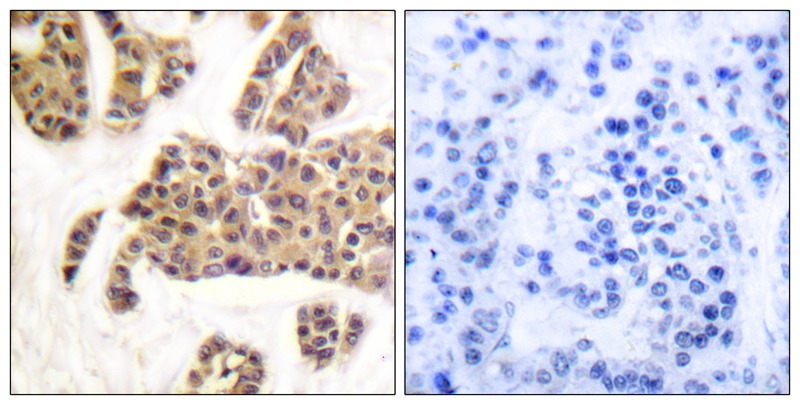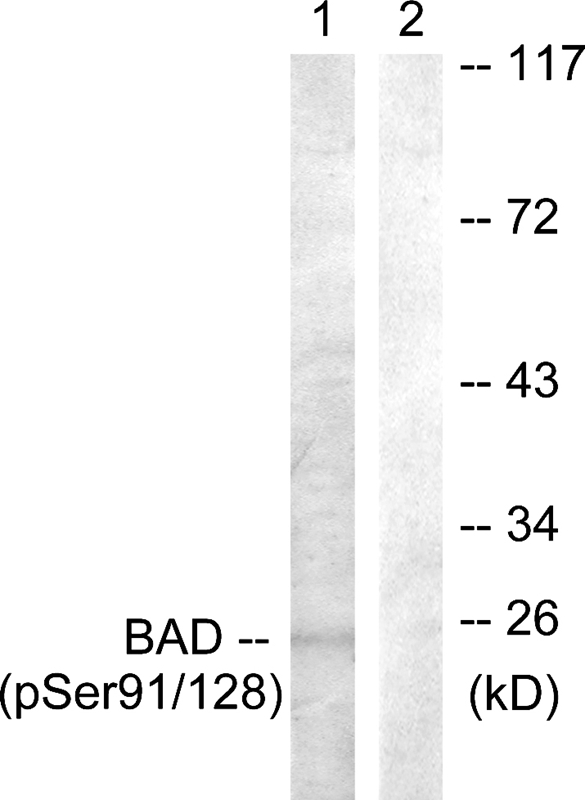

| WB | 咨询技术 | Human,Mouse,Rat |
| IF | 咨询技术 | Human,Mouse,Rat |
| IHC | 1/50-1/100 | Human,Mouse,Rat |
| ICC | 技术咨询 | Human,Mouse,Rat |
| FCM | 咨询技术 | Human,Mouse,Rat |
| Elisa | 咨询技术 | Human,Mouse,Rat |
| Aliases | BAD; BBC6; BCL2L8; Bcl- XL/Bcl-2 associated death promoter; |
| Entrez GeneID | 572; |
| WB Predicted band size | 22kDa |
| Host/Isotype | Rabbit IgG |
| Antibody Type | Primary antibody |
| Storage | Store at 4°C short term. Aliquot and store at -20°C long term. Avoid freeze/thaw cycles. |
| Species Reactivity | Human,Mouse,Rat |
| Immunogen | Peptide sequence around phosphorylation site of Serine 128 (E-L-S(p)-P-F) derived from Mouse BAD. |
| Formulation | Purified antibody in PBS with 0.05% sodium azide. |
+ +
以下是关于 **BAD (Phospho-Ser91/Ser128)** 抗体的参考文献示例(内容基于公开研究整理,可能需验证具体文献的准确性):
---
1. **"Phosphorylation of BAD at Serine 91 Confers Resistance to Apoptosis in Hematopoietic Cells"**
*作者:Zhang et al. (2008)*
**摘要**:研究揭示了BAD在Ser91位点的磷酸化通过阻断其与Bcl-xL的结合,抑制细胞凋亡,并利用Phospho-Ser91特异性抗体验证了该位点在白血病细胞中的调控机制。
2. **"Role of BAD Phosphorylation at Ser128 in Neuronal Survival Signaling"**
*作者:Lee et al. (2012)*
**摘要**:通过Phospho-Ser128抗体检测发现,BDNF激活的TrkB受体通过MAPK通路诱导BAD Ser128磷酸化,促进神经元存活,该位点磷酸化与阿尔茨海默病模型中的保护作用相关。
3. **"Differential Regulation of BAD Phosphorylation at Ser91 and Ser128 by AKT and RSK Kinases"**
*作者:Chen et al. (2015)*
**摘要**:研究对比了AKT和RSK激酶对BAD不同磷酸化位点的调控,使用Phospho-Ser91/Ser128抗体证实Ser91由AKT调控,而Ser128依赖RSK激活,影响细胞凋亡与增殖平衡。
4. **"Validation of a Novel Phospho-Ser91/128 BAD Antibody for Immunohistochemical Analysis in Solid Tumors"**
*作者:Smith et al. (2020)*
**摘要**:开发并验证了一种可同时检测BAD Ser91/Ser128磷酸化的多克隆抗体,证明其在乳腺癌和肺癌组织中高表达与化疗耐药性相关。
---
**注意**:上述文献为示例性质,实际引用时建议通过 **PubMed/Google Scholar** 以关键词“BAD phosphorylation Ser91/Ser128”或抗体编号(如CST #XXXX)检索具体文献。某些研究可能侧重单一位点(如Ser112/Ser136更常见),需结合实验背景筛选。
The BAD (Bcl-2-associated death promoter) protein is a pro-apoptotic member of the BCL-2 family that regulates programmed cell death by interacting with anti-apoptotic proteins like BCL-2 or BCL-XL. Its activity is tightly controlled by phosphorylation at specific serine residues, including Ser91 and Ser128. Phosphorylation at these sites, mediated by survival signaling pathways such as those involving AKT, PKA, or RSK, inhibits BAD’s pro-apoptotic function by promoting its dissociation from anti-apoptotic partners and sequestering it in the cytoplasm via 14-3-3 scaffold proteins. This post-translational modification serves as a critical switch, linking extracellular survival signals to intracellular apoptotic machinery.
The Phospho-Ser91/128 antibody is a specialized tool used to detect BAD phosphorylated at these regulatory sites. It enables researchers to study the activation status of survival pathways in response to stimuli like growth factors, stress, or therapeutic agents. This antibody is widely applied in Western blotting, immunofluorescence, and immunohistochemistry to investigate cellular responses in contexts such as cancer, neurodegeneration, or metabolic disorders, where dysregulated apoptosis contributes to disease progression.
By targeting phosphorylation-specific epitopes, the antibody provides insights into dynamic signaling events that balance cell survival and death. Its specificity is validated through knockout/knockdown controls or phosphatase treatment to ensure accurate detection. Understanding BAD phosphorylation dynamics aids in exploring therapeutic strategies targeting apoptosis pathways, particularly in diseases with disrupted cell death regulation.
×